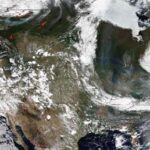The recent derecho and heat wave that struck the Metropolitan area has left some climate scientists saying climate change is partly to blame.
An article on Gazette.Net reports, according to climate scientists and a number of state officials, the events of the past two weeks are consistent with what Maryland faces as a result of climate change.
“Fires, drought, more extreme weather events — this is what it looks like,” Zoe Johnson, program manager for climate policy in the Office for a Sustainable Future with the Maryland Department of Natural Resources, told the Gazette. The recent heat wave “shows us ways we’re vulnerable now.”
She also said the recent extended heat wave has demonstrated other issues that climate change will bring to the area.
Washington, D.C.’s 11-day heat wave ranked as the most intense in 141 years of records, according to The Washington Post.
The hottest day was July 7 with a record high of 105 degrees Fahrenheit, which is tied for second just behind the record set in July of 1930 at 106 degrees Fahrenheit.
Although climate scientists say there are too many variables to say with certainty that the current weather directly is related to global warming, the numerous days of extreme temperatures in Maryland and other parts of the country, as well as the drought and wildfires in the West, are all consistent with the effects of gradually warming temperatures from climate change.
“You can’t point to one individual event and say that’s a result of climate change,” ESSIC Director Dr. Antonio Busalacchi told the Gazette. “What you can say with extreme confidence is this is what it will look like in the future.”
The forecast models for climate change, he said, consistently have predicted there would be more extremes in temperatures and storm events.
Although there are some who doubt the validity that climate change is the result of human-related activities, Busalacchi said the scientific consensus is overwhelmingly in agreement that it is.
“There are those who deny it because they don’t want to believe it. It becomes a matter of ideology because the facts get in the way,” Busalacchi said. “There are legitimate policy issues about what to do, but my job is to state what we know and what we don’t know.”
Regardless of belief in climate change validity, Johnson and Busalacchi both said Maryland needs to take steps to adapt to the changes the state is facing.
One step the state should take in the short term to adapt to climate change is to require utilities to bury power lines, according to Busalacchi.
Johnson said other changes need to be looked at as well.
“The state needs to reconsider road-building materials so it can avoid a repeat of the wide buckling of U.S. 50, which occurred after several days of “heat-upon-heat,” Johnson told the Gazette.
A kink on Metro’s Green Line that caused a train derailment in Hyattsville on July 6 was seen as a result of climate change. Other cracks have been found in the rails, according to the Gazette.
CICS Director Dr. Phillip Arkin told the Gazette, as for climate change deniers, “If you have a firm belief that global warming isn’t occurring, then facts are irrelevant to you.”






